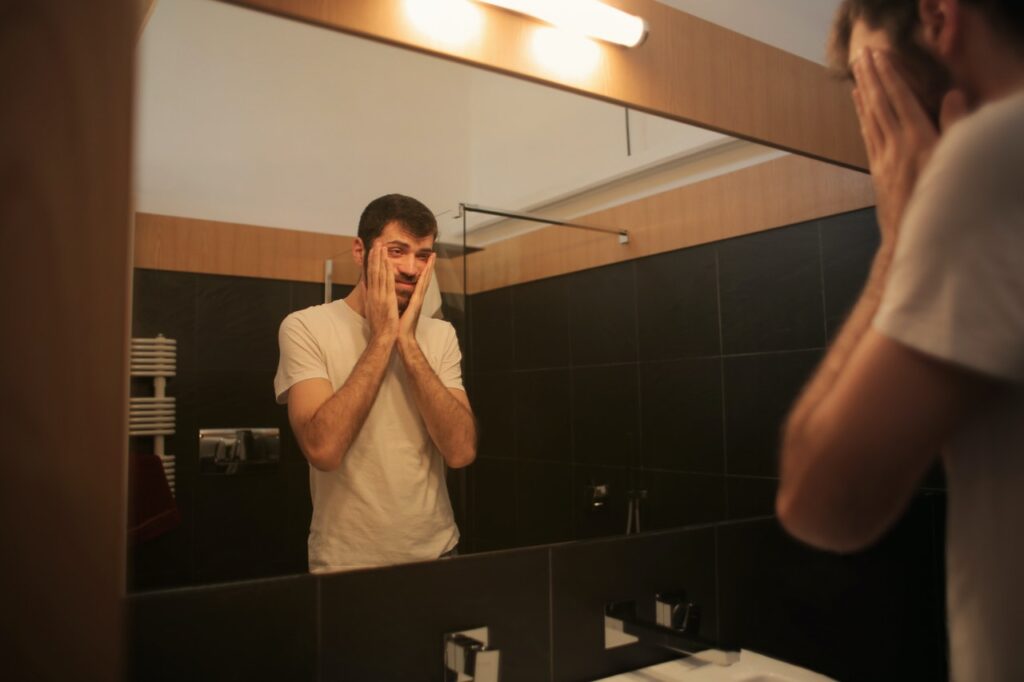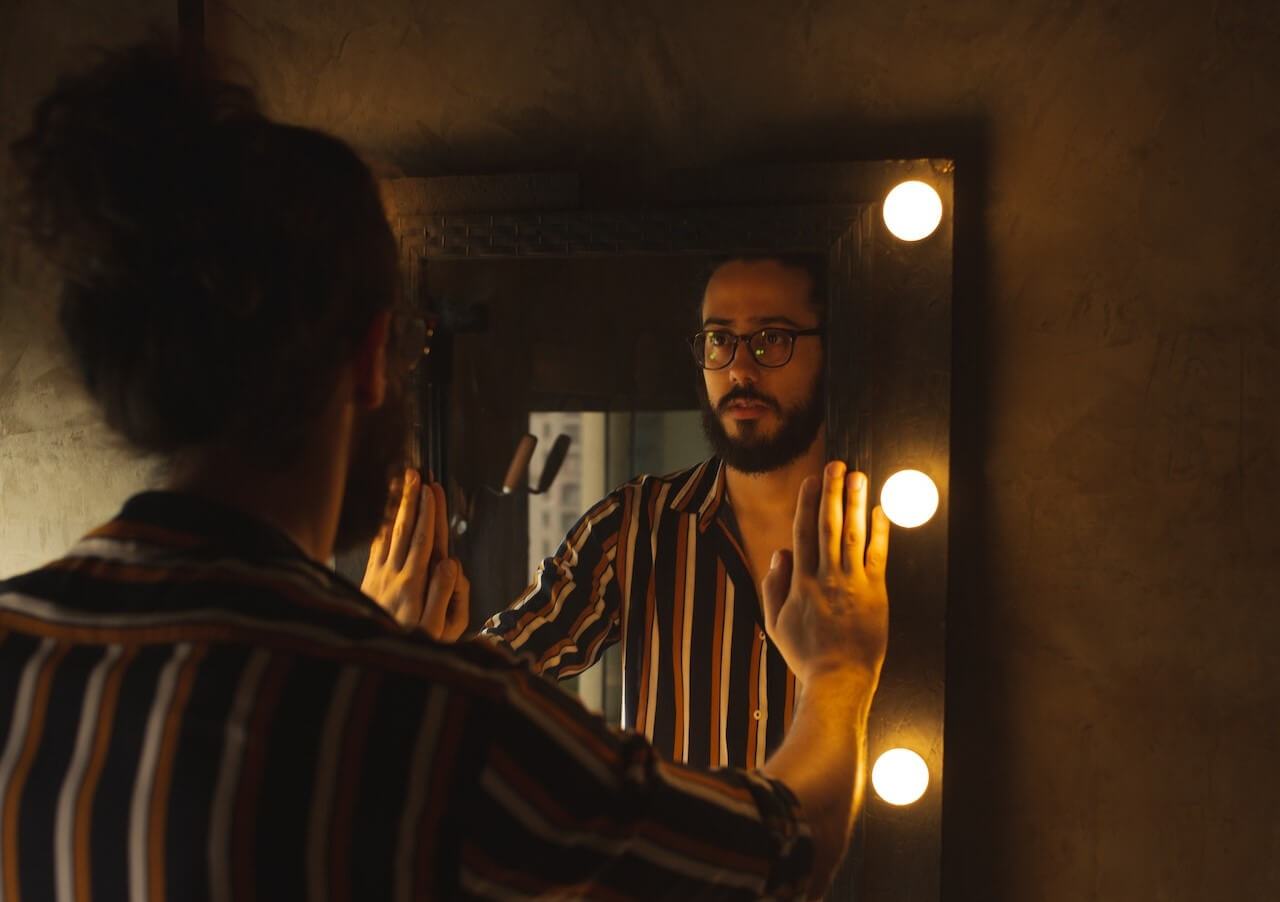Have you tried looking at yourself in the mirror for meditation lately? It seems easy, just looking into your own eyes. People say it can be really impactful. But before you start, there are a few things you should know.
Staring at your reflection for a long time can bring up some unexpected psychological effects that no one really warns you about. While it helps some people, for others, it can bring on anxiety, weird thoughts, and even mild hallucinations.
What Is Mirror Meditation?
Mirror meditation involves gazing at your own reflection while in a meditative state. The basic idea is you sit in front of a mirror and just gaze at your reflection while meditating. At first, it might seem weird looking at yourself, but the goal isn’t really to check yourself out.
You’re supposed to use the mirror to look past your outside and connect with who you are inside. Some people say it helps overcome ego and really accept yourself for who you are. Others find that staring at their reflection allows them to examine what’s going on in their mind and how they’re feeling; it gives them insight into their thoughts and emotions.
How To Do Mirror Meditation
The whole process is incredibly easy. Here is a step-by-step guide:
- Find a quiet, distraction-free place and sit facing a mirror.
- Relax, focus on your breathing, and gaze softly at your reflection. Try to avoid judging what you see.
- Notice details about your face and body. Sense how you feel inside. This helps shift your awareness away from your outward appearance to your inner self.
- As thoughts and feelings arise, observe them without attachment before gently bringing your focus back to your reflection.
- Do this for 5 to 20 minutes a day. Over time, you may experience a sense of peace, wisdom, and interconnectedness.
The Potential Dangers of Mirror Meditation
Though touted as a simple self-reflection practice, mirror meditation does come with some potential dangers. It can put you into negative headspace or attract bad vibrations. It could also damage your spiritual health if you’re not careful.
Psychological Effects
Staring at your reflection for an extended period of time can bring up uncomfortable feelings or trauma you may have suppressed. Some people have reported feeling disconnected from themselves or feeling really anxious. A few people have even said they started seeing things that weren’t there. If you ever start feeling upset while looking in the mirror, stop right away.
Inviting Dark Energy
Mirrors have always been believed to act as doorways that allow spirits and other dimensional beings to cross over into our world. Some spiritual teachers are convinced that staring into a mirror during meditation can invite negative energies and ghosts into your life.
I know, it sounds totally out there. But if you’re someone who believes in the paranormal, they say mirror meditation might not be such a good idea. Unless you take some precautions first like lighting candles or wearing a protective amulet.

Body Image Issues
Focusing so intently on your physical appearance, as mirror meditation requires, could amplify those negative thoughts for some people. Your self-worth has nothing to do with what you see in the mirror. If you find yourself being overly critical or getting stuck in unhealthy thought patterns about your looks, it’s probably best to avoid mirror meditation for now.
Spiritual Risks
Some spiritual teachings warn against mirror meditation as it can lead to spiritual confusion or attachment to one’s ego or physical form. The reflected image is seen as an illusion, and prolonged staring into one’s own eyes is thought by some to be a conduit for negative energies or entities.
Proceed With Caution
Mirror meditation can be a very powerful experience for some people. But for others, it can stir up some uncomfortable feelings or memories they weren’t expecting. If you give it a try and start feeling stressed or worried, don’t push through it – just stop. Your mental health is more important than any meditation trend. And don’t let anyone make you feel like you have to do it, either. There are lots of calmer options out there to choose from, so do what feels right for you.
The Benefits of Mirror Meditation
Mirror meditation, or gazing at your reflection during meditation, can be an intense experience with some benefits when done properly and in moderation.

Self-Acceptance
Looking at yourself for a longer time while in an altered state of consciousness can increase self-awareness and -acceptance. You may gain insight into your behaviors, habits, and thought patterns. This can be profoundly healing and help you let go of self-judgment.
Concentration
Mirror meditation is also said to increase focus and concentration. Staring at any single point for a long duration requires mental discipline and can strengthen your ability to direct and control your attention.
Self-Reflection
Mirror meditation provides an opportunity for deep self-reflection. When you look into your own eyes, you can explore your inner thoughts, feelings, and emotions in a non-judgmental way. This practice encourages you to become more self-aware and more in tune with yourself.
My Final Thoughts
On the surface, mirror meditation seems pretty straightforward, but I have to say it’s not for everyone. Some people find it really gets them in their feels in a bad way, bringing up stuff from their past or just making them anxious.
If you’ve dealt with trauma, anxiety, depression, or even just hating what you see in the mirror, this could end up doing more harm than good. Ultimately, you have to listen to yourself and go with what feels right.
And if staring in the mirror leaves you feeling upset, don’t force it. Trust your gut on that. There’s lots of different ways to meditate and be mindful, so try something else that vibes with you better. However you find your inner peace is all that matters.








